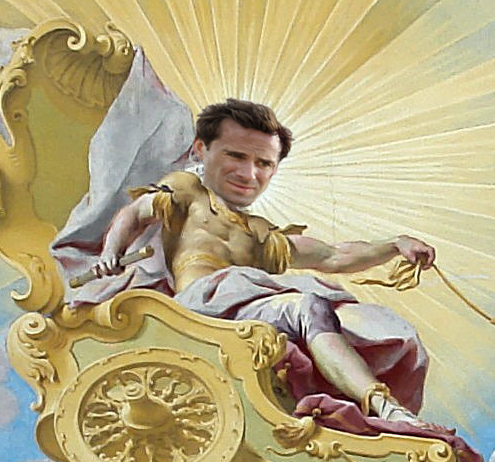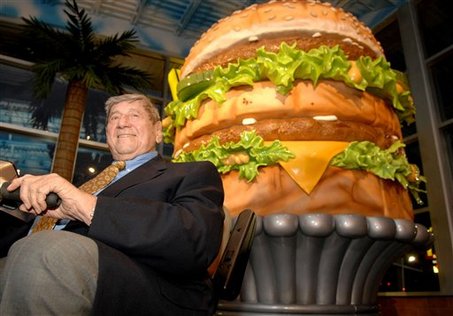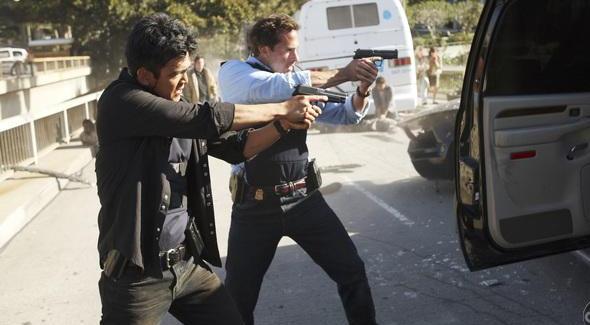Which brings us, finally, to ABC’s new show, FlashForward, created by David Goyer (who, amazingly, wrote both The Dark Knight and Jumper), Brannon Braga (who wrote more than 100 episodes of the later day Star Trek series Enterprise and Voyager), and Robert Sawyer (“The Dean of Canadian Science Fiction” who actually came up with this whole idea).
The basic premise of the show is that on October 6, 2009, the entire world blacks out for 2 minutes and 17 seconds. During that time, everyone has a vision of the future on April 29, 2010. Everyone sees through their own eyes the events of that one period of time. Presumably, many of the visions are mundane events (we know of at least one vision of time spent on the toilet), some people don’t have visions (and are presumably going to die in the intervening six months), and some people see visions of the future that seem improbable, impossible, or life changing.
***SPOILERS***
Regardless of the nature of the vision, this vision of the future has a profound effect on how people live. In the show, this is focused primarily on whether or not the visions will come true. Will Joseph Fiennes backslide into alcoholism and will his images of an ongoing investigation into the cause of all this actually help in today’s world? Will his wife be living with another man? So far, all of the visions have come true and the show seems to be about getting from here to there.
That is until the end of the last episode, in which an FBI agent who had received a vision of the future in which he was responsible for accidentally killing an innocent woman decides to kill himself, thus ensuring that his vision and at least one other will not come to pass. Suddenly, these characters, who already possess the godlike characteristic of being “outside of time,” the power to shape their futures and, in this case, give life to others.
Earlier, that same FBI agent had casually played Russian Roulette, secure in the knowledge that his vision of himself in the future mean he couldn’t die today. He does this to get into a basement full of people who didn’t have visions and are clubbing their hearts out before the curtain falls. While the lack of vision has condemned them to mortality, the presence of vision has made the rest of planet immortal.
In short, the underlying premise of the show has changed. In giving every human being immortality along with the power to both see and shape the future, the 2 minutes and 17 seconds in FlashForward represent the apotheosis of mankind, and the question becomes, what if we were all gods?

So what would you do?
According to the show, a world full of human gods is a sort of angsty place. Frankly, I think most Americans would act like me: check to see whether or not they’ve gotten really fat in the future, then eat really glorious fatty foods for six months. That’s real godhood.
Given the chance to peep into your life six months from now, would you do it?
Would you hope for an interesting or dramatic vision, or are you cool with seeing 2 minutes and 17 seconds of the Lost finale?
Then again, if you were absolutely certain that you’d be alive on April 29, 2010, what would you do?

The fruits of immortality.
PS: On Firefox, in the google search box, start typing “free will.” How sad that the first four options are about an unusually liberated whale.

I’m wondering why no one has suggested to the people without visions that they will be asleep in the future. I can’t recall anything about people seeing themselves asleep or experiencing a dream.
**SPOILER**
Of course, that wouldn’t explain why Zoey insists she saw Dimitri at their wedding and he saw black; but we haven’t seen all of her flashforward, just pieces (flashes of the flash, so to speak) of it, so she could just be seeing *a* wedding and not *their* wedding. And I suppose at this point maybe Aaron Stark saw a dream, but the preview makes it look like he’s about to find her really soon… Gah.
I’d say Al’s killing himself effects more than just his and the woman’s lives. There are her kids, too- whatever they saw or didn’t see will theoretically change; Agent Kingston (the gal from MI6) put tape on the window already, and she obviously won’t be in the meeting with Al, since he’s, you know, dead; and anyone the mother, her kids, and Kingston will now be able to interact with will experience something different than their flashforward(s), too. Once I got over the “NOOOO!” moment, I realized the ramifications of his suicide could be rather large.
But I want to talk about the Russian roullette a bit deeper. At first I thought he did it because, as you put it, he was “secure in the knowledge that his vision of himself in the future mean[t] he couldn’t die” when he had the gun to his chin. After all, that’s what he says to the other guys. But then I thought about it and realized he could also have felt secure in the knowledge that his vision *wouldn’t matter* because he had already planned on killing himself. What if, to him, it didn’t make a difference how or where he died, since he knew he’d commit suicide soon, anyway? If that’s the case, it would seem as though he and thus every other character has total agency over their future. Dimitri could just hide himself away somewhere for a few days before the day of his murder; Mark could simply not go to the office and (not-so-simply) avoid drinking; etc.
Either way, Al’s suicide gave at least Kingston presumed agency, since, again, she went and put the tape on the window. Unless someone takes it off and she doesn’t put it back on, that has been changed. And Mark burned that bracelet, so we’ll have to wait and see if he gets another one, but if not, there’s another example.
*Spoiler alert with reference to the original novel rather than the show, which may, depending upon how the show goes, might also be future spoilers thereof*
Okay, so I’ve not seen the show, but having read this article, as well as the original novel (Which is excellent by the way) it’s pretty much a given in the novel that no vision meant dead, but that additionally, visions were changable by explicit human agency (Characters who -had- visions with which they were dissatisfied suicided, rendering the vision invalid)
Which raises the question, I suppose, as to whether or not people who experienced no vision could in fact have ended up still alive through relevant action (Though in the novel, the flash foward is over 20 years, rather than 6 months, and -many- very old people experienced no vision, which is what made it a lot more conclusive to the people in the novel that no vision meant dead)
In the novel, they also find out exactly what caused the flashforward, and plan to make another one happen, with results that continue to suggest no vision universally meant dead.
Another potential interpretation of the visions in the flashforward reminds me of a concept that I recently saw described in Neal Stephenson’s Anathem. If you consider the many-worlds theory of quantum mechanics, (The one that suggests that any time a choice is made, additional universes are spun off in which each of those choices took place) you could end up with a situation where each person experiences a vision of a “possible” or even “very likely” future. Something along the lines of “If things go how they are going, this is what you will end up as” so it’s not set in stone, but it is very likely. People who accept their vision as fated or factual will likely have that borne out because they won’t make any drastic changes in their life. Those who don’t accept it and takes steps to the contrary can avertit.
This gets people who end up experiencing exactly what they saw, people who have averted what they saw, and people who were ‘dead’ that might not end up that way, and people who were alive who ended up dead.
The reason some people experienced no vision at all could well be that there -were- no -likely- futures in which they were alive. It isn’t necessarily a -fated deterministic FACT- that they die, but like a world in which gravity works backwards, or americans give up the right to bear arms, there is just no -plausible- set of circumstances that would bring that world into existance, and so they saw nothing.